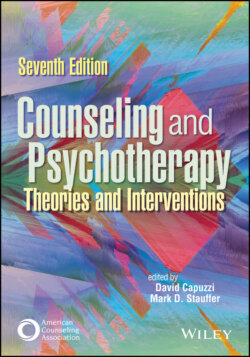Читать книгу Counseling and Psychotherapy - Группа авторов - Страница 38
Immediacy
ОглавлениеImmediacy is the ability to deal with the here-and-now factors that operate within the helping relationship (Clemence et al., 2012). These factors are described as overt and covert interactions that take place between the client and the counselor or therapist. A client’s anger at a counselor or therapist, the latter’s frustration with a client, and the feelings of the client and counselor for each other are all examples of factors that need to be addressed as soon as they occur and develop (Mayotte-Blum et al., 2012). Addressing such issues in the safety of the helping relationship should help participants in two ways: Participants can (a) gain insight into personal behavioral patterns that may or may not be conducive to growth and (b) use this insight in relationships outside the helping relationship. As an example, a counselor might ask, “How is sharing with me right now, given our cultural difference and the mistrust you feel?” or “How is our work together going?” when a client has mentioned it is hard to share.
Dealing with these factors can be threatening, because it is often easier to deal with relationships in the abstract and avoid personal encounters. A counselor or therapist needs to be able to use this factor of immediacy to show clients the benefits that can be gained by dealing with issues as they arise. According to Egan (2013), immediacy not only clears the air but also is a valuable learning experience.
Personal characteristics or behaviors that enhance a counselor’s or therapist’s ability to use immediacy effectively include, but are not limited to, the following:
The capacity for perceptive accuracy in interpreting one’s own feelings for, thoughts about, and behaviors toward clients
The capacity for perceptive accuracy in interpreting clients’ feelings for, thoughts about, and behaviors toward the counselor or therapist
The capacity for and willingness to deal with one’s own issues related to clients on a personal as opposed to an abstract level
The willingness to confront both oneself and clients with what one observes to be happening in the helping relationship
